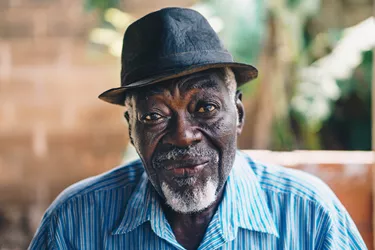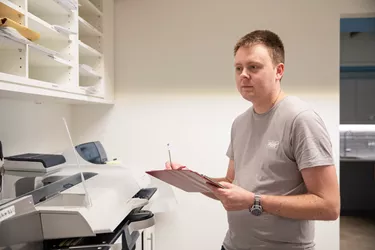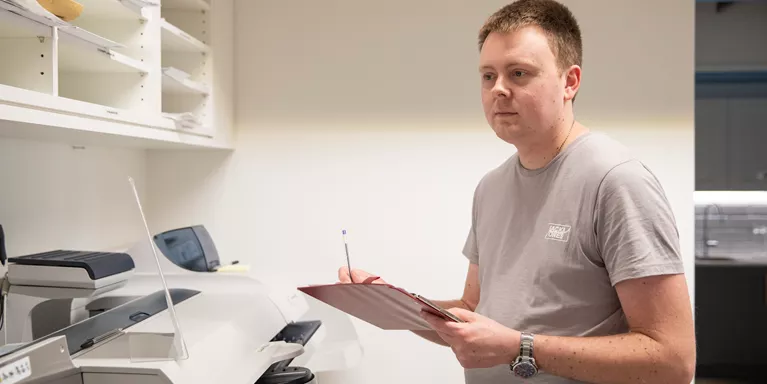Supporting the mental health of my colleagues
Emily is a Safety Health and Environment Manager at Morgan Sindall, a leading construction company. She was the winner of our Wellbeing Lead Award at our Workplace Wellbeing Index Awards 2017/18 and blogs about how her personal experience has helped her better support the mental health of her colleagues.
I have always suffered with a lack of self-confidence, even as a child, but as I got older this developed further in to social anxiety and then even more so in to generalised anxiety. I was first diagnosed with generalised anxiety disorder around four years ago, although I had been suffering since I can begin to remember.
Due to various personal factors in early 2017, things took a turn for the worse and I quickly fell in to what I can only describe as a black hole.
"I was soon diagnosed with severe depression, and I realised that actually, I had been feeling like this for months, even years."
I had just been coping with it because I didn’t actually realise there was anything wrong with me. It was just who I was.
On a ‘bad day’ my typical feelings and symptoms could range from having uncontrollable racing thoughts about myself, becoming extremely tearful, being paranoid about other’s opinions and thoughts about me, convincing myself that I am a failure and that no one really cared about me.
This is incredibly tiring, and I would often not sleep, spending the night replaying the events, interactions and conversations from that day in my mind.
Some days I couldn’t even get out of bed, and only wanted to stay in a dark room on my own, where it felt ‘safe’.
Generally, my illness is under now control and I have taken positive steps to manage the way I feel. I take an SSRI anti-depressant (Selective Serotonin Reuptake Inhibitor) to manage the major symptoms and have undergone Cognitive Behavioural Therapy. The CBT taught me rational coping mechanisms to use when I was experiencing what are known as ‘dysfunctional thoughts’ and how to challenge these before they become repetitive and ultimately damaging to my wellbeing.
"I didn’t realise the extremity of my illness until I started to get well again."
I have learnt that in order to get support from others, you have to be transparent about your feelings in the first place. People who are suffering may not always appear to be suffering on the surface – a lot of energy goes in to creating a façade.
I’ve been working in the construction industry for around eight years and I have responsibility for supporting the mental health and wellbeing across our workforce – this is both with direct and indirect employees.
"In our industry suicide kills more construction workers than falls from heights and whilst I’ve noticed positive changes within the industry towards health and wellbeing, there’s still a long way to go."
There are so many more of us suffering than you could ever know, and by opening up about my experience I believe this will continue to assist others to do the same.
"I have shared my illness with others already and in turn this has prompted them to speak up too, which has made me feel that I am not alone."
We are now in a place where several people have documented their experiences of living with a mental health problem which I use to help break down the barriers about speaking up.
As part of my role I run initiatives to drive awareness of mental health including delivering mental health awareness training and encouraging others to talk about their mental health at various events such as Time to Talk day.
I’ve also trained as a Mental Health First Aider and I have been successful in encouraging my colleagues to do the same, with Mental Health First Aiders now available across our construction projects and offices. I have also more recently delivered CPD training on mental health to some of the younger persons within our industry via the Chartered Institute of Building at the request of one of my colleagues – it is vital that we start tackling any potential stigma at the earliest opportunity.
It really is ok not to be ok – as cliché as that sounds, we will all experience mental illness directly or indirectly at some point in our lives, so the more we talk about it the better. Having a mental illness doesn’t make someone weak. Being mentally unwell is no different to being physically unwell – why would we not approach both in the same way?


Information and support
When you’re living with a mental health problem, or supporting someone who is, having access to the right information - about a condition, treatment options, or practical issues - is vital. Visit our information pages to find out more.
Share your story with others
Blogs and stories can show that people with mental health problems are cared about, understood and listened to. We can use it to challenge the status quo and change attitudes.

















